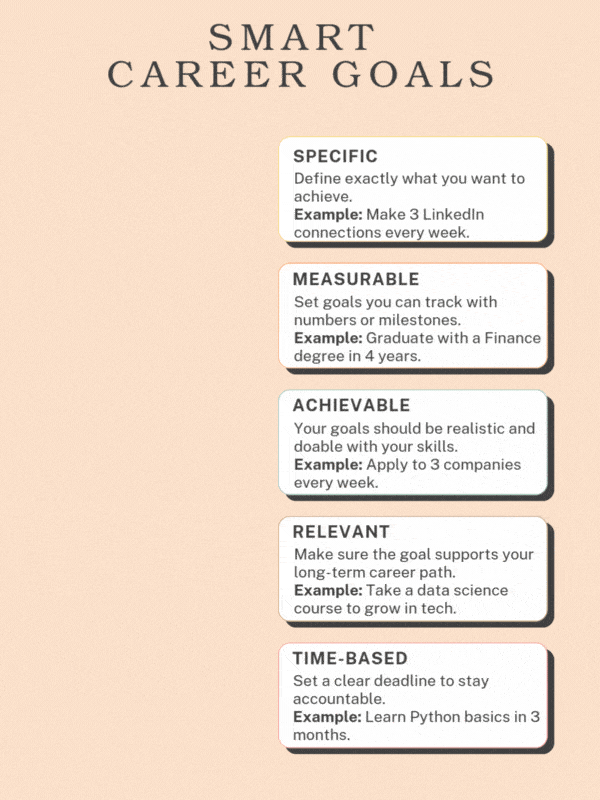

Quick Summary
Did you know that setting clear career goals can make you 42% more likely to reach them? But what are your career goals, and why define them? When you define your goal, you create a plan to stay motivated and focused. It’s a proven way to move forward with confidence. Whether you’re looking for a promotion, moving to a new industry, or working on personal growth, it will be easier to track progress if you have clear goals.

Whether you are a student looking at job options or a professional considering your next move, setting career goals gives your journey direction. Career goals are specific objectives that guide your learning, growth, and decisions during your work life. They can be as immediate as getting an internship this year or as long-term as becoming a company CEO. Defining your goals helps you stay focused, motivated, and true to your personal and professional values.
In this blog, you’ll find over 10 examples of career goals for different situations. You’ll also get simple, actionable tips to create and achieve your goals. Let’s work together to determine a career path that fits your skills, interests, and dreams. Read on to see your career goals that you can easily reach.
Career goals are specific objectives that guide your professional journey. They show what you want to achieve in your career, whether gaining specific skills, reaching a certain job title, working in a particular industry, or making a meaningful impact.
You can reach these goals within a few weeks to 1 or 2 years. They serve as stepping stones toward your long-term ambitions.
Examples:
These take several years, often 5 to over 10, and involve major milestones in your career.
Examples:
These goals aim to boost job performance and productivity.
Examples:
These focus on gaining new skills or mastering existing ones.
Examples:
These relate to your earning potential or reaching financial milestones.
Examples:
These involve formal or informal education to advance your career.
Examples:
These focus on taking on supervisory or strategic roles.
Examples:
These target building professional relationships and increasing visibility.
Examples:
These combine personal growth with professional impact.
Examples:
Having a clear career goal is more than just a good idea. It’s essential for personal and professional growth. Here’s why it matters:
Setting goals is just the first step. Achieving them requires consistent action. Here are some tips to help you succeed:
Pro Tip: Set monthly or quarterly career check-ins with yourself to track progress.

Setting clear goals is essential, but setting SMART goals makes them achievable. SMART stands for:
S – Specific: Define exactly what you want to achieve.
Example: “I want to become a digital marketing manager in the healthcare industry.”
M – Measurable: Make sure your goal can be tracked.
Example: “I will complete two certifications in 6 months.”
A – Achievable: Set realistic goals based on your skills and resources.
Example: “I will apply to 3 companies each week.”
R – Relevant: Your goal should connect with your long-term ambitions.
Example: “This course supports my career plan to enter data science.”
T – Time-bound: Set a deadline to stay accountable.
Example: “I will learn Python basics in 3 months.”
You’re more likely to achieve your goals following this SMART structure. You can also track your progress along the way.
Here are some career goals for every stage of your professional journey. Whether you’re just starting, looking to advance, or aiming for leadership, defining your career goals will help you stay focused and motivated. Setting clear short-term and long-term objectives ensures steady growth, enhances your skills, and opens doors to new opportunities.
When you first start your career, focus on building a strong foundation. At this stage, your goals should be developing your skills, gaining experience, and understanding your field. Defining what are your career goals early on will help you create a clear path toward growth. Prioritizing learning opportunities, networking, and hands-on experience ensures you build the expertise needed for long-term success.
After gaining a few years of experience, your goals shift to growing into leadership roles and expanding your expertise. This stage is about solidifying your position and preparing for more responsibilities. Defining what are your career goals at this point helps you stay on track, whether it’s pursuing management training, mentoring junior colleagues, or taking on challenging projects to showcase your leadership potential.
At the senior level, your goals are to significantly impact your organization or industry and leave a lasting legacy. Defining what are your career goals at this stage may include mentoring future leaders, driving innovation, or influencing company strategy. Whether it’s becoming a thought leader, expanding your network, or contributing to industry advancements, your focus is on making a meaningful difference.
One of the fresher’s most common interview questions is about their career goals. Here are some practical ways to respond:

Remember, when answering interview questions about your career goals, be honest, realistic, and enthusiastic about your chosen path.
Setting clear career goals is key to success. It provides direction, helps you track progress, and keeps you motivated. Defining your career goals allows you to break them into achievable steps, making growth more manageable. Clear goals also ensure your actions align with your passions and values, making long-term commitment easier and more fulfilling. A strong response to “What are your career goals?” highlights your long-term vision, skills, and how you plan to grow while contributing to the company’s success.
Remember to keep track of your goals often. As your ambition keeps changing, you can also decide on your goals. As your career keeps moving forward, your goals will shift as well. But if you can act on and reassess it, that will help you stay focused. By now you must have figured out what are your career goals. But remember that defining your career goals is not just about what you want to achieve but also about who you wanna become.
Every goal you set becomes part of your professional identity. Whether it’s your resume, LinkedIn profile, or elevator pitch, your career goals shape your brand.
Remember, the more your goals match your brand, the more confidently you can present yourself to recruiters and employers.
In job interviews, you’ll often be asked, “What are your career goals?” Here’s how to respond:
Keep your answer focused, realistic, and relevant to the job you’re applying for.
When discussing your career goals in an interview, there are some common mistakes to avoid:
Setting clear career goals isn’t just about planning; it’s how you gain control of your future. Whether you want to land your first internship, climb the corporate ladder, or start your own business, your goals serve as a personal GPS that guides every step.
Remember, your goals don’t need to be perfect; they just need to be meaningful. Start small. Stay flexible. Track your progress. Celebrate your successes. Most importantly, believe in your potential.
Now that you know how to create SMART goals, choose the right path, and match your ambitions with your personal brand, the next move is up to you. So grab a notebook, think about your passions, and write down your next big goal. Your future self will appreciate it.

Career goals are specific objectives that individuals set to achieve in their professional life. They may include seeking promotions, acquiring new skills, transitioning to a different industry, achieving work-life balance, or pursuing further education. Setting clear career goals helps to focus efforts and measure progress towards professional aspirations.
Over the next five years, I want to take on a leadership role. In this position, I can mentor others, help with decision-making, and develop my skills in [your field]. I plan to keep learning and achieving meaningful results.
My goal is to keep growing in my career by improving my skills, working on challenging projects, and making a meaningful contribution to my organization. I want to move into a leadership role where I can impact and help my team develop.
My career goals include advancing my expertise in my field, taking on leadership responsibilities, and contributing to organizational growth. I aim to continuously learn, innovate, and make a meaningful impact through my work over the next few years.
A good answer to “What are your future goals?” should be clear, specific, and related to the job and the company’s needs. It should show you understand your career path and how this position fits into it. Make sure to highlight both your short-term and long-term goals. It’s essential to be realistic, express a desire to learn and grow, and explain how your goals can help the organization.

Authored by, Rashmi Jaisal
Career Guidance Expert
Rashmi is a Content Strategist who creates research-driven content focused on education, higher education policy, and online learning. She brings an energetic blend of expertise in technology, business, and literature, sparking fresh perspectives and engaging narratives. Outside of work, she’s a passionate traveler who enjoys journaling and curating visual inspiration through Pinterest boards.
Editor's Recommendations
Chegg India does not ask for money to offer any opportunity with the company. We request you to be vigilant before sharing your personal and financial information with any third party. Beware of fraudulent activities claiming affiliation with our company and promising monetary rewards or benefits. Chegg India shall not be responsible for any losses resulting from such activities.
Chegg India does not ask for money to offer any opportunity with the company. We request you to be vigilant before sharing your personal and financial information with any third party. Beware of fraudulent activities claiming affiliation with our company and promising monetary rewards or benefits. Chegg India shall not be responsible for any losses resulting from such activities.